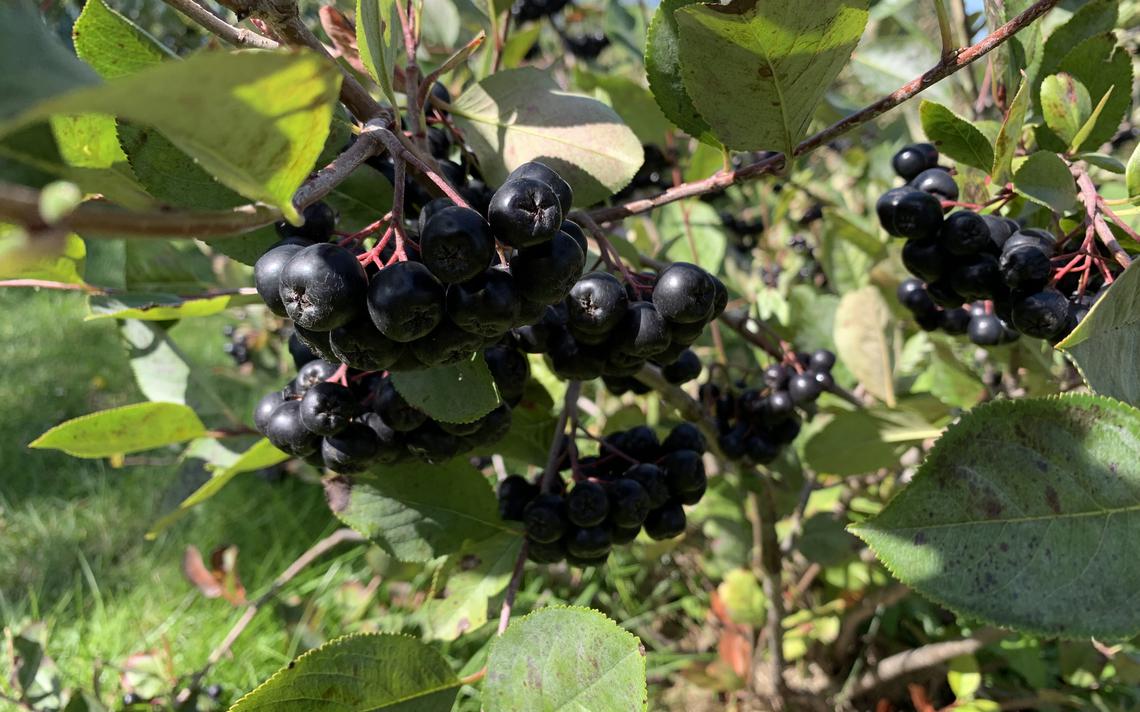But what is it about these little, tart, black berries that would make a family of growers so excited to plant more than 33,000 bushes of them and share their power with the community by inviting them to the farm? The secret lies in the juice.
Aronia is a type of shrub native to North America however, its popularity began in Eastern Europe, where the health benefits have been studied for many years.
“(Aronia berries) produce compounds that help reduce inflammation in the body,” says Kathy Wiederholt, fruit project manager for North Dakota State University’s Carrington Research Extension Center. “A lot of the research comes from Eastern Europe because these have been used for a very long time there.”
Wiederholt says that although the bushes are native to the U.S., they’ve only been growing commercially in the states for a little over a decade — with Nebraska and Iowa being the top-producing areas.
Wiederholt said there were 70 or 90 acres of aronia in North Dakota. “Including all the other states, there’s about 1,800 acres of aronia,” she said.
These bushes take about five years to reach full maturity and feature shiny green leaves and bright white flowers that turn into purple-black berries that taste sweet, but have an astringent quality to them — helping them to earn their nickname “chokeberry” from the drying-feeling that comes when one eats the berries.
While their unique flavor can sometimes turn people off, the health benefits that come with aronia berries more than make up for it.
After a friend of his dad recommended aronia juice to help with inflammation, Greg Nelson began planting his own bushes, hoping the dense contents of polyphenols will help reduce the effects of his chronic obstructive pulmonary disease. Nelson is now co-owner of Nelson Aronia Farms and part owner of Ax-water, an aronia berry-infused, health and wellness beverage that provides a natural source of antioxidants, where some of his crop will be headed after harvest.
“(Aronia berries) are native to North America,” Nelson said. “It’s very healthy, it’s low cost and it’s something I think should be in everyone’s daily diet.”
The berries are also reported to have anti-cancer and anti-diabetic effects, as well as promote organ, artery and blood vessel health. According to the Mayo Clinic, adding antioxidants to your diet can help fend off the effects of free radicals, or molecules produced when the body breaks down food or is exposed to tobacco smoke and radiation. The polyphenol-rich berry can also provide brain-boosting memory function.
“(I eat them in) multiple ways,” says Nelson. “I do the Ax-water, of course, but I also do them in smoothies. Instead of blueberries, I do aronia berries. Then I just eat them. It’s an acquired taste.”
To celebrate their first harvest and bring awareness to the superberry, Greg and his son Chase hosted their inaugural Aronia Berry Harvest Festival.
“We wanted to get people interested in the aronia berry,” said Chase Nelson, co-owner of Nelson Aronia Farm, “make it a household name.”
Vendors and artisans from around the area came out to show off the many uses of the berry — like using the juice to stain wood products.
“Our main event is the chefs,” Chase says. “They’re going to compete, kind of like a ‘Chopped’ cook-off. Whoever has the best dish will win.”
From cheesecakes and salads to beer and wine, aronia berries can be eaten fresh or used as an ingredient in a variety of foods, but eating them right out of the field can get a little, well, dry.
“They’re really dry,” Chase said. “They’re a unique flavor, would be a way to say it. If you mix them with other ingredients, it makes them a lot easier to eat. Our goal is to show people what they taste like in different foods and different recipes.”
















